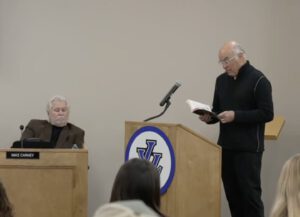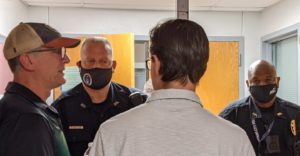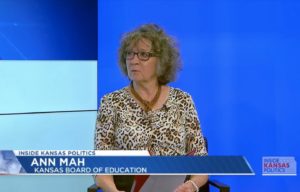Kansas mom spearheads petition for right to speak at public meetings
(The Sentinel) – An online petition is proposing to amend the Kansas Open Meetings Act to require all meetings of public bodies and agencies, particularly school boards, to allow time for public…

(The Sentinel) – An online petition is proposing to amend the Kansas Open Meetings Act to require all meetings of public bodies and agencies, particularly school boards, to allow time for public comment.
Organizer Samantha Lefebvre sees it as a freedom of speech issue:
“What I hope to accomplish is to spread awareness to as many Kansas voters as possible that their ability to address their school boards publicly is currently a matter of individual board policies per the KOMA. This is incongruent with the Constitution of the State of Kansas. In addition to spreading awareness on this particular point, I hope to spark some interest among community members to become more involved with their local school boards and local governments in general. The right to freedom of speech and the democratic process is a gift and Americans should use it.”
Local elected officials have taken many steps to prevent or restrict public comment, including Johnson County Commission Chair Ed Eilert, who eliminated comments at a meeting in 2020. Many school boards have moved the public comment section outside the regular board meeting so people watching the meeting online don’t see the comments and avoid having a record of public comments.
While Section Three of the Bill of Rights of the Kansas Constitution assures the right to petition government:
§ 3. Right of peaceable assembly; petition. The people have the right to assemble, in a peaceable manner, to consult for their common good, to instruct their representatives, and to petition the government, or any department thereof, for the redress of grievances.
That right is not absolute per KOMA, as explained in the attorney general’s “A Citizens Guide to Open Government:”
Does a public body or agency have to let members of the audience speak at a meeting? No, the KOMA does not require that the public be allowed to speak. Some other law may require a public hearing with the opportunity to speak on that issue, but the KOMA does not.
For example, Supreme Court proceedings are exempt from an opportunity for public comment.
Lefebvre writes on the petition website:
The purpose of this petition is to formally declare that Kansas students, public school faculty/staff, parents/guardians, taxpayers and voters have a right to consult, instruct, and petition for the redress of grievances in a public forum before their local school boards, a body of elected officials. All Kansas school boards should be required to both provide time for public comments as part of their meetings, and keep a public record of these comments, to be accessible to the community upon request.
What comes next? Petition-in-hand, Lefebvre figures to be busy in Topeka:
“In addition to presenting the petition to the state board of education, I plan on sending a copy to our Attorney General as well as our state Senate and House of Representatives. I hope that bringing this to their attention will help them see the desire Kansans have for a requirement that school boards hear and keep record of public comments, and that it may spark some conversations and action from them as well.
“And of course, I hope that school boards will be required to take public comments and keep a record of them… whether that means changing the KOMA or passing other legislation.“
Lefebvre hopes to collect 1,000 signatures on the petition. This first week of June shows over 530 have already signed.



